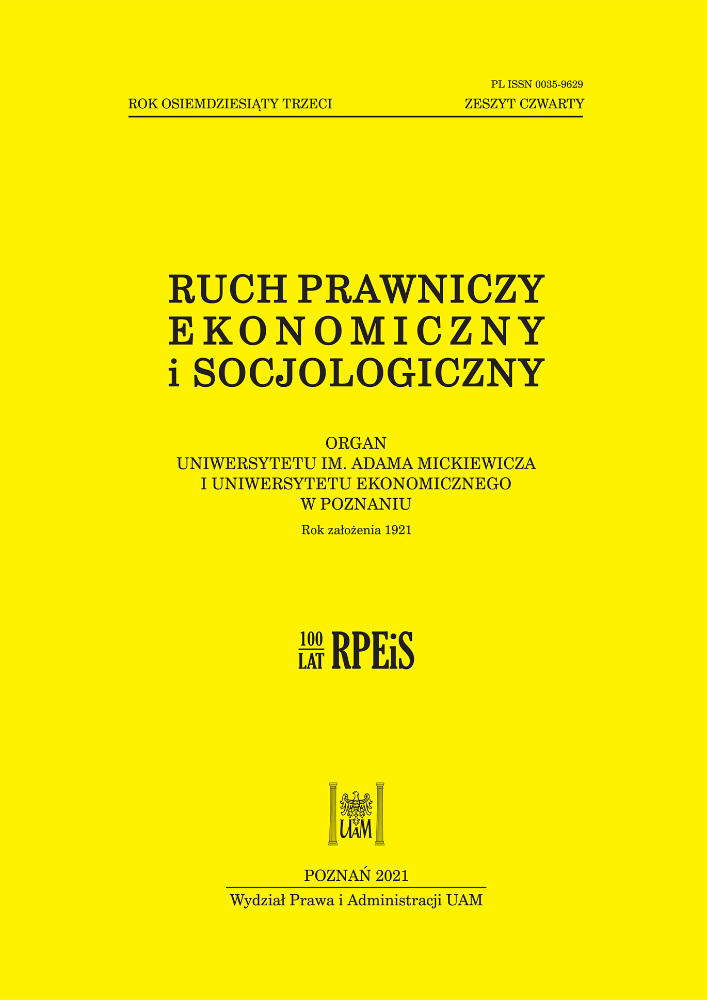Abstract
The aim of the article is to present the results of research on intergenerational relations in connection with the situation of seniors at the threshold of retirement age and demographic challenges. The study – part of a broader project of multigenerational longitudinal studies – covered two groups representing the senior generation (60-year-olds) and respondents at the same age as their adult children (38-40-year-olds). Thanks to this, it was possible to get to know the perspective of both generations, understood more broadly – as communities shaped by different socio-cultural circumstances and representing a different socialization effect: specific values, life orientations, attitudes towards the family and family obligations or attitudes toward society. The older generation remains at the centre of analysis, and the questions posed here concern the chances of being cared for, in terms of the willingness of the younger generation to help. In search of answers to these questions, the following factors were juxtaposed: (i) their material, health and family situation, (iii) socio-demographic variables that may affect the life situation, (ii) attitudes towards the family, (iv) the socialization context of both generations, indicative for intergenerational solidarity, and (v) the subjective perception of the social world. As a result of the conducted analysis, the groups were identified – mainly based on status and demographic characteristics – to which public policies (health policy, support for the families) could particularly be adapted, in terms of the offer of support.
Funding
National Science Centre grant 2014/15/B/HS6/03158 2014/15/B/HS6/03158
References
Bengtson, V.L., Oyama, P.S. (2007). Intergenerational Solidarity: Strengthening Economic and Social Ties. Expert Group Meeting in United Nations Headquarters (23–25 October 2007).
Bengtson, V.L., Roberts R.E.L. (1991). Intergenerational solidarity in aging families: an example of formal theory construction. Journal of Marriage and the Family 53(4): 856–870.
Drozdowski, R. (2012). Solidarność pokoleń – dobrze brzmiący postulat polityki społecznej, z którym ma ona coraz więcej kłopotów. Ruch Prawniczy, Ekonomiczny i Socjologiczny 74(3): 7–19.
Dykstra P., A., van den Broek T., Muresan C., Haragus M., Haragus P-T., Abramowska-Kmon A., Kotowska I., E. (2013). State-of-the-art report Intergenerational linkages in families. Families and Societies Working Paper Series 1.
Garewicz, J. (1983). Pokolenie jako kategoria socjofilozoficzna. Studia Socjologiczne 1(88): 75–81.
Grotowska-Leder, J., Roszak, K. (2016). Sandwich generation? Wzory wsparcia w rodzinach trzypokoleniowych: na przykładzie mieszkańców dwóch gmin województwa świętokrzyskiego. Łódź: Wydawnictwo Uniwersytetu Łódzkiego.
Kotlarska-Michalska, A. (2016). Dylematy towarzyszące realizacji zasad solidarności rodzinnej. Na podstawie relacji między pokoleniami w rodzinie. Studia Socjologiczne 2(225): 167–188.
Kwak, A. (2017). Rodzina na wiele wariantów, ale czy z mniejszym zakresem solidarności? Studia Socjologiczne 2(225): 145–166.
Łuczak, P., Orczyk, J. (2012). Ekonomiczne przesłanki zmian w formach solidarności międzypokoleniowej. Casus opieki długoterminowej w Polsce. Ruch Prawniczy, Ekonomiczny i Socjologiczny 74(3): 203–216.
Mangen, D.J., Bengtson, V.L., Landry, P.H. (1988). Measurement of intergenerational relations. Newbury Park, Calif.: Sage Publications.
Mannheim, K. (1938). The problem of generations, [w:] Essays on the Sociology of Knowledge. New York: Oxford University Press.
Nyce, S., Sylvester, J., Schieber, J. (2011). Ekonomiczne konsekwencje starzenia się społeczeństw. Warszawa: PWN.
Okólski, M. (2010). Wyzwania demograficzne Europy i Polski. Studia Socjologiczne 4(199): 37–78.
Ossowska, M. (1963). Koncepcja pokolenia. Studia Socjologiczne 2(9): 47–51.
Steiner, A.M., Flechter, P.C. (2017). Sandwich generation caregiving: a complex and dynamic role. Journal of Adult Development 24(2): 133–143.
Szafraniec, K. (2001). Zmiana społeczna przez brak konfliktu pokoleń. Przegląd Socjologiczny 50(1): 13–39.
Szafraniec, K. (2010). Młode pokolenie a nowy ustrój. Warszawa: Wydawnictwo IRWiR PAN.
Szafraniec, K. (2011). Młodzi 2011. Warszawa: Kancelaria Prezesa Rady Ministrów.
Szafraniec, K. (2022). Pokolenia i polskie zmiany. Studium socjologiczne na podstawie badań wzdłuż czasu. Wydawnictwa Naukowe PWN [w druku].
Tuijnman A.C. (1989). Recurrent education, earning, and wellbeing: a fifty year longitudinal study of a cohort of Swedish men. Stockholm: Almqvist & Wiksell.
Tobiasz-Adamczyk, B. (2012). Niekorzystne aspekty wieku starszego z perspektywy socjologii medycyny, [w:] M. Zrałek. Przestrzenie starości. Sosnowiec: Oficyna Wydawnicza Humanitas.
Woźniak, Z. (2012). Solidarność międzypokoleniowa w starzejącym się świecie – perspektywy i zagrożenia. Ruch Prawniczy, Ekonomiczny i Socjologiczny 74(3): 21–63.
Yilmaz, N., Hazer, O., Öztürk, M.S. (2018). Intergenerational solidarity and life satisfaction in elderly. Turkish Journal of Geriatrics 21(3): 429–437.
<https://www.zus.pl/swiadczenia/emerytury/emerytura-dla-osob-urodzonych-po-31-grudnia-1948/emerytura-w-wieku-powszechnym> [dostęp: 10.08.2020].
License
Copyright (c) 2021 WPiA UAM

This work is licensed under a Creative Commons Attribution-NonCommercial-NoDerivatives 4.0 International License.





